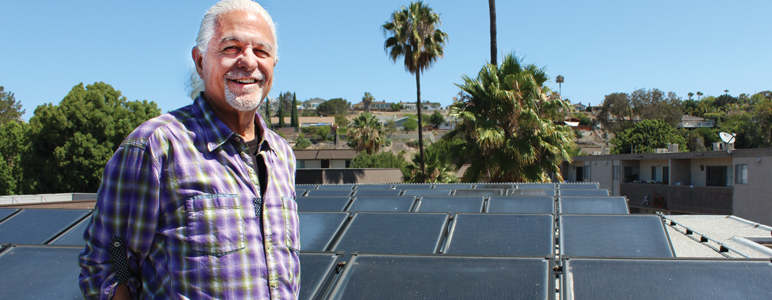

Higher California Solar Initiative rebates provide a greater value proposition
Owners and managers of multitenant housing developments know that each resident’s shower, load of laundry and sink full of dishes adds to the cost of heating water on their property’s ever-increasing utility bills.
Typically, such needs for hot water are met by conventional heating systems using electricity or natural gas, but the value proposition for installing solar water heating has never been better. State rebates and federal tax incentives are at an all-time high, making solar a perfect match for multitenant facilities, such as apartment buildings and dormitories, with centralized water heating systems and large daily hot water loads, according to experts at the Center for Sustainable Energy (CSE).
Originally published July 20, 2015, in the San Diego Business Journal special section “Sustainable San Diego.”
Sarah Smith, CSE’s solar thermal program manager, stated that solar water heating systems can displace most of the electricity or gas used to heat water and achieve money-saving and sustainable operations. “Virtually any facility with a need for hot water and a roof exposed to the sun can take advantage of solar water heating,” she said.
Good news, bad news
Smith expresses urgency for property owners to consider adopting solar thermal technologies because the currently available cost-cutting rebates and incentives are set to expire or be reduced over the next two years.
The good news is that earlier this year the California Solar Initiative (CSI) increased solar water heating rebates that knock off 30-40 percent of the cost of multitenant system installations and that the federal government offers a 30 percent tax credit for this technology.
The bad news is that the federal tax credit will fall to 10 percent in December 2016 and the state rebates are set to expire at the end of 2017, or sooner if funds are expended.
How it works
Solar water heating systems use the sun’s energy to preheat water. They absorb the heat in solar thermal collectors installed on a building’s rooftop and transfer it, via water or another liquid, to a storage tank. The facility’s conventional water heater then draws the preheated water out of storage when there is demand for hot water, boosting its temperature only if necessary. Solar water heating systems are simple and can reduce natural gas use for water heating up to 80 percent.
Because sunshine is abundant and free, a solar water heating system can pay for itself over a few years from the utility cost savings, something a conventional heater can never accomplish, according to Smith. She said they operate automatically and require minimal regular maintenance during their more than 20-year lifetime, and with the additional hot water storage capacity, the facility’s residents will always have plenty of hot water.
Solar thermal in La Mesa
William Lamden, owner of Lamden Property Management, put a solar watering heating system on the nearly 50-year-old, 38-unit Michael Arms Apartments in La Mesa in 2013. Installed by Adroit Solar, the system consists of 40 solar collectors covering about 900 square feet of rooftop.
“Solar water heating helps keep our operating costs in control by reducing and stabilizing our annual utility budget,” Lamden said.
The initial system cost was $121,800, but with a $50,000 CSI-Thermal rebate and accelerated depreciation Lamden’s final out of pocket expense was minimal. The system cut the natural gas use at Michael Arms by 42%, resulting in a nearly $6,000 utility savings in the first year and will deliver considerable, ongoing utility bill savings for the next 20-25 years.
“When you hear the offers and see all of the ads for solar, and you are kind of turned off and think it’s a gimmick, think again,” Lamden said. “Solar water heating really works and it can be very cost-effective.”
Down by the beach
Property manager Pete Ceccherini of RG Investment Real Estate reports a new solar water heating system completed in February on the 24-unit Jo-Mar Apartments in Ocean Beach has reduced natural gas use by an average of 200 therms per month for domestic hot water use, equal to about a $250 utility bill savings.
The main system at Jo-Mar, installed by SunUp Solar Systems, has 10 solar collectors covering about 410 square feet of rooftop. It cost $36,000, received a $28,000 CSI-Thermal rebate, the federal tax credit and accelerated depreciation, providing an immediate payback. A second system not connected to the facility’s boiler, directly heats a swimming pool with 12 solar collectors. It also received a generous CSI-Thermal rebate.
Ceccherini said apartment property owners generally are pretty frugal and reluctant to spend on improvements, but if their location and solar roof exposure is correct and the property’s hot water use is at a sufficient level, “solar water heating is a no-brainer."
“There are misunderstandings out there about solar water heating and its reliability and maintenance, but I can’t say enough about how well it is working at Jo-Mar – I am a true believer,” Ceccherini said.
New construction downtown
Owners of newly constructed multitenant facilities also qualify for the same range of rebates, tax incentives, depreciation and long-term energy savings with the added bonus of the solar water heating system counting toward meeting California’s strict energy efficiency building code requirements, known as Title 24 standards.
At the Urbana East Village Rental Flats, a 96-unit luxury apartment complex owned by H.G. Fenton Company and opened in January, California Solar Thermal Inc. installed a system with 45 solar collectors. It cost about $250,000 and received a CSI-Thermal rebate of nearly $120,000.
According to California Solar Thermal owner Matt Traficonte, the system offered a very substantial Title 24 credit and was more economical for Fenton Company than installing triple-glaze windows, R50 insulation or almost anything else to meet Title 24 requirements.
“Heating water is one of the highest operating costs for multitenant property owners,” Traficonte said. “However, with solar water heating, they have an opportunity to monetize that liability up front while greatly reducing ongoing monthly utility costs.”
Overcoming misconceptions
Peter Dunbar, vice president of SunUp Solar Systems, said solar water heating works throughout the county, even along the coastline. On a recent overcast day, the Jo-Mar apartment building’s system in Ocean Beach started the morning at 89 degrees Fahrenheit and by midday had climbed to 130 degrees.
“Many property owners are not doing solar water heating because they just don’t know enough about it,” Dunbar said. “It’s the real deal.”
So what keeps more multitenant property owners from considering solar water heating?
According to William Chen, Adroit’s chief operating officer and vice president of engineering, it’s likely they have heard stories about solar water heating from back in the 1980s when the systems installed often didn’t work very well, and they have not looked into the newer technologies or heard about the generous incentives.
“It’s one of the best investments a property owner can make – much better than the stock market and many other investment strategies,” Chen said.
Solar water heating also adds a “green” appeal by lowering greenhouse gas emissions for those seeking to live a more sustainable lifestyle, according to Luciana Da Silva, Adroit’s marketing director. She said this is particularly true for millennials who list sustainability among the top five things they are looking for in an apartment.
Get more information
Commercial and multifamily properties are eligible for CSI-Thermal rebates up to $800,000 per installation. In addition, commercial, municipal and multifamily swimming pools are eligible for solar thermal rebates that can cover up to 50 percent of the cost of the solar pool system.
For more information about installing solar water heating and the available CSI-Thermal rebates, contact CSE at 858-244-1177 or visit energycenter.org/hotwater.
Other Businesses Ideal for Solar Water Heating
- Laundry facilities
- Restaurants & cafeterias
- Fitness centers & spas
- Hotels & lodging
- Water amusement parks
- Wineries & breweries
- Process heat for food
- Process heat for industry

